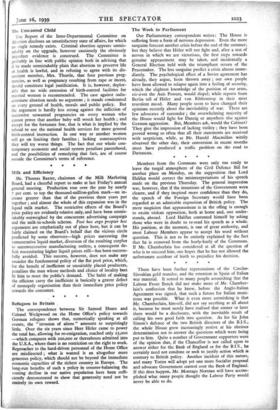Milk and Efficiency Mr. Thomas Baxter, chairman of the Milk
Marketing Board, had a cheerful report to make at last Friday's annual general meeting. Production rose over the year by nearly 7 per cent. to top the thousand-million-gallon mark—an in- crease greater than that of the previous three years put together ; and almost the whole of this expansion was in the liquid milk market. The restrictive effects of the Board's price policy are evidently relative only, and have been unmis- takably outweighed by the concurrent advertising campaign and the milk-in-schools scheme. Post hoc ergo propter hoc arguments are emphatically out of place here, but it can be fairly claimed on the Board's behalf that the vicious circle predicted by some observers—high prices narrowing the remunerative liquid market, diversion of the resulting surplus to unremunerative manufacturing outlets, a consequent de- ficit necessitating higher liquid prices still—has been success- fully avoided. This success, however, does not make any sounder the fundamental policy of the flat pool price, which, for the benefit of inefficient or unsuitably placed producers, penalises the man whose methods and choice of locality best fit him to meet the public's demand. The habit of making the efficient carry the inefficient is basically a graver defect of monopoly organisation than their immediate price policy towards the consumer.






















































 Previous page
Previous page